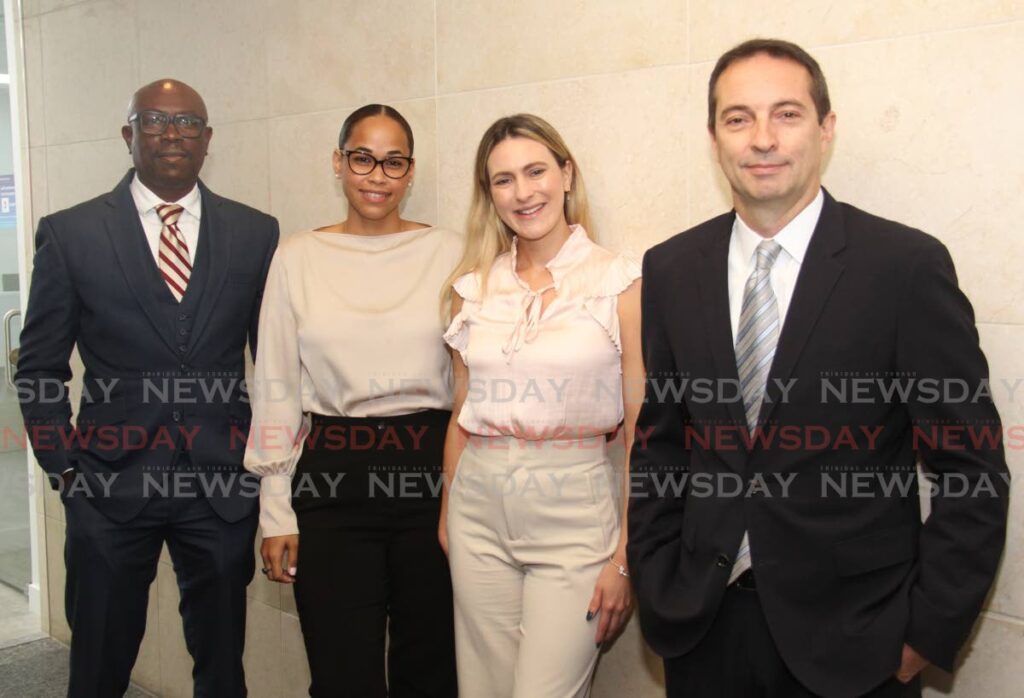Mastercard looks to tech-payment solutions for TT

Credit card giant Mastercard hopes to offer technology-based payment solutions to government, business, and citizens as it opens an office in TT.
Mastercard Caribbean division manager Marcelo Tanguioni said this was the fourth office the company had opened in the Caribbean, the others being Jamaica, Dominican Republic and Puerto Rico.
He said Mastercard’s goal was to include a billion people worldwide in the formal economy, and with an average 50 per cent of the people in the region being either unbanked or underbanked, the Caribbean division was ready to focus on improving the lives of the people.
“It was surprising when I started managing the business here how the opportunities were still out there. All the stakeholders in the electronic payments environment were not necessarily putting the right energy, the right focus and investment in things. We had more mature markets that were growing at a faster pace than our markets here, and that was mind-boggling, as sometimes less mature markets have higher growth rates..."The first commitment I made to the organisation when I presented the plan to make those investments was that I was going to at least double the pace of growth in the region.”
TT and Eastern Caribbean country manager Dalton Fowles said while the company is best known for credit cards, it offered many more ways of making payments.
“We’ve evolved into what we call a multi-rail technology, so we’re looking at payments across all the rails.
"Traditionally we were about credit-card payments; now we’re doing account-to-account payments, with one of our subsidiaries, Vocalink, being one of the largest account-to-account payment networks across the world.
"We’re now partnering with a lot of banks and financial technology (fintech) companies to do cross-border payments; and we’re having a lot of success in crypto spaces as well.
"We’re also very good at security and compliance, as you’re not going to be successful in payments unless you can support the ecosystem.”
Tanguioni said the company was very proud of its security and compliance systems.
“Mastercard has never had any successful attacks against it. It’s one of the most targeted organisations in the world, with thousands of attacks attempted daily.
"We concentrate 60-70 per cent of personal card consumption in US, so having not-so-friendly countries getting access to that would shut down the country, and we’re in more than 200 countries. Security is at the top of our priorities because we know it’s a major problem and will be so for the foreseeable future.”

Fowles said the company’s plans for the region would be affected by at least two factors: regulations and culture.
“In Europe they are moving to open banking, and while in our region regulations are catching up and a lot more regulators are creating that space for fintechs and issuers etc, there are still some opportunities to improve in order to create incentives for people to want to make that investment.
“Culture will play a role in terms of a lot of small businesses being willing to move away from cash, but then you have to create incentives around that. For example, with a small business owner who is used to cash, the conversation is about whether we want to get you financially included. We have to have other components, for example, access to affordable credit, and this is where public-private partnership becomes important.”
Business development director Danielle Dumas said the Mastercard network supports the back end of payment apps such as WhatsApp Pay and Venmo. She said its advisory arm, which focuses on payment strategies, compares with companies such as Ernst & Young, PriceWaterhouseCoopers and DeLoitte.
Communications manager Sabrina Alvarez said the company also partners with NGOs such as the Crisis Planet Coalition, the World Bank, and the Red Cross on environmental, social, and governance initiatives.
“One initiative we want to implement here in TT is our Girls For Tech programme, where we do a one-day workshop in a school for girls aged eight-14 and we educate them on STEM and encourage them to become future leaders. So we want to partner with schools to do that here.”
Fowles said the company wants to drive knowledge and growth in TT, including creating local fintech partnerships.
“That will be driven in part by the regulatory framework that the various regulators in the region put in place. And we like the direction we’re seeing from the regulators, they’re beginning to understand that if you want financial and digital inclusion, it’s one thing to create the framework for them to come, but another to create the framework to develop your own local expertise.”
Speaking about TT’s blacklisting by the EU, he said many Caribbean countries are seen as high risk by a lot of multinationals
“My view is that a lot of regulators are putting in the work through their local partners to improve the various regulatory controls that are recommended.”
Tanguioni said one of the consequences of that increasing risk is how hard it is becoming for businesses to make international payments, and especially when they have to rely on correspondent banking.
“There’s a lot of banks that used to be in that space that are reducing appetite for that type of activity, and sometimes even moving away from it.
"One of the solutions which we are bringing to market is the ability to offer account-to-account payments on a cross-border basis, and would eliminate the need for the corresponding bank.”
Dumas said the company would be offering its expertise in public policy to the Central Bank and others working in the financial ecosystem.
“Being a global multinational company, we are leveraging the global experience of countries that have successful fintechs, and bringing that sort or education to our Central Bank and hopefully everyone working together in the ecosystem.
"As the government is very bullish on digital transformation, it will help the Central Bank understand the various options. They say they’re cautious but open. They’re conservative by nature, as they have to protect the ecosystem, the payment system, the individuals, etc, so leveraging on that multinational experience of regulators who have allowed it will also bring that value to TT and the Caribbean.”
Asked about Central Bank's recently approving Paywise Ltd to issue electronic money, Fowles said this would not affect the company’s plans.
“E-money issuers are important, not just to the local economy, but it’s the start of a journey that will drive the inclusion we’re talking about, because they have specific market knowledge they’re solving, and we’re willing to partner with them.
"Market research has shown that closed loops don’t work, and the major networks create that openness. Partnership drives that: it drives down the cost, it builds awareness in terms of knowhow and technology, and again, they have deep insights in terms of the opportunities that are in the market and the challenges that affect them.”
Fowles noted that in Jamaica, Mastercard had enabled businesses to pay taxes to government using credit cards rather than cheques. He also said in the Dominican Republic the company had been able to help the government in issuing the value of its annual Christmas hamper through prepaid cards, which citizens could then use to buy groceries and other necessities.
“We are the technology provider. We partner with a local government-owned bank, they provide the money, and we provide knowhow, technology and execution.
"That programme became a positive worldwide case for us. This is our third year doing it, and the first year we did the programme, we set it up in 60 days.”
Fowles said there were many discussions taking place and he was confident TT would soon see some of these products on the market.

Comments
"Mastercard looks to tech-payment solutions for TT"